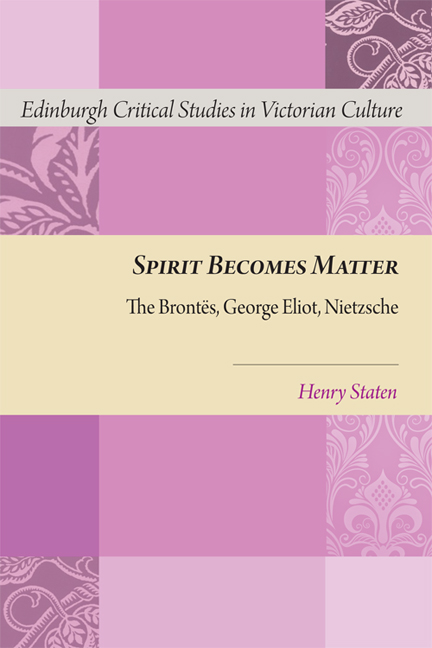Book contents
- Frontmatter
- Contents
- Series Editor's Preface
- Author's Preface
- Acknowledgements
- Dedication
- Introduction
- 1 The Poisoned Gift of Forgiveness (Jane Eyre)
- 2 Subincision of the Ethical Subject (Middlemarch)
- 3 What Things Cost in Middlemarch
- 4 The Return to the Heath (Wuthering Heights)
- 5 Spirit Becomes Matter
- Index
Author's Preface
Published online by Cambridge University Press: 05 August 2016
- Frontmatter
- Contents
- Series Editor's Preface
- Author's Preface
- Acknowledgements
- Dedication
- Introduction
- 1 The Poisoned Gift of Forgiveness (Jane Eyre)
- 2 Subincision of the Ethical Subject (Middlemarch)
- 3 What Things Cost in Middlemarch
- 4 The Return to the Heath (Wuthering Heights)
- 5 Spirit Becomes Matter
- Index
Summary
The traditional moral psychology practised by the earlier realist novel involved an ironic, rather than strictly critical, treatment of the moral consciousness of characters. The realist narratorial voice spoke from an authoritative moral perspective that was grounded on the established religio-moral values (altruism, goodness, self-restraint, forgiveness) all of which are modalities of the fundamental Christian value of self-denial. From the perspective of the unquestioned validity of these ‘ascetic ideals’, as Nietzsche called them, the traditional narrator was able to communicate to the reader the real motives behind what the narrated persons consciously told themselves, and to assign their proper moral weight to these motives. By contrast, the novels at the centre of the present study show that, beyond the difficulties individuals have in thinking and acting according to the established moral values, there is something problematic about the values themselves, and specifically about their ideal nature. Nietzsche was the first to bring the critique of ideal values to fully explicit statement, notably in The Genealogy of Morals, but he was not the first to practise it; among his precursors, I argue, are Charlotte Brontë, Emily Brontë and George Eliot. The practice these four writers in some measure share I call critical moral psychology.
When I first began, some twenty years ago, to think along the lines developed in this book, it worried me that I should be thinking back from Nietzsche to these novelists and finding affinities between them. I didn't want to find things in the novels that weren't there; and I certainly didn't want to treat these great writers as mere adumbrations of Nietzsche. Only gradually did I realise that the work on Victorian physio-psychology or ‘mental materialism’ that I kept coming across was crucial to my own project. The pioneering work on Victorian physio-psychology, The Healthy Body and Victorian Culture, had been published by my old friend and colleague at Utah Bruce Haley in 1978, and I had read it then; but I didn't realise its significance until a few years ago when I reread Sally Shuttleworth's 1996 book on Charlotte Brontë and Rick Rylance's 2000 book on Victorian psychology.
- Type
- Chapter
- Information
- Spirit Becomes MatterThe Brontes, George Eliot, Nietzsche, pp. viii - ixPublisher: Edinburgh University PressPrint publication year: 2014

